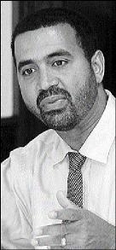
De La Haye
The following statement over the signature of its president, Dr Winston de la Haye, was issued by the Medical Association of Jamaica in response to a Sunday Gleaner story about payments made for overtime to doctors.
The Medical Association of Jamaica empathises with the current economic challenges being faced by our country. We recognise the need to implement cost-saving measures throughout the country. However, any proposed cost-saving measure which has the potential to adversely affect patient care and health-service delivery in Jamaica will not be supported by the medical fraternity.
We continue to urge the Government to invite all stakeholders in the health-care system to engage in dialogue related to cost-saving measures for the health sector so decisions can be made, based on scientific evidence. We stand ready to contribute to this process.
We have not been invited to participate in any dialogue related to the implementation of a proposed change in working hours for doctors in public hospitals as a cost-saving measure, nor have we been provided with any such proposal. We ask the Government to provide us with the details of the report on the four-month survey on a regional health authority which was referred to in The Sunday Gleaner of November 1.
Existing salary structure
The existing salary structure for doctors was arrived at after years of wage negotiations between the Jamaica Medical Doctors' Association (formerly Junior Doctors' Association) and the Government. The 75 per cent figure being quoted as the proportion of the budget allocated to salaries is a total figure, not only for physicians, but applies to all other allied health-care workers, with doctors getting the lowest rates for overtime and emergency services. Statements of this nature only serve to minimise the significant long-standing issue of inadequate and unrealistic budgetary support for the Ministry of Health.
The lack of adequate numbers of physicians employed in some areas and at some hospitals has resulted in a few physicians working extraordinarily long hours, for which they are compensated. It is, therefore, unfair to use these exceptions to be the norm, resulting from fewer physicians being employed than required, to scapegoat the dedicated and hard-working doctors in our country. Indeed, a large proportion of physicians at hospitals work outside of their scheduled hours without compensation. The current system of staff allocation for routine, as well as emergency services, has been proven over the years to be the most effective method of health-care delivery in a system with severe shortages such as ours.
We need to be reminded of the inadequate and unrealistic budgetary support for the Ministry of Health (10 per cent of GDP is the recommended value by the WHO, not three - four per cent!), which will continue to result in a large percentage of the budget being allocated to salaries. This underfunding of the health sector has resulted in a deterioration of the Jamaican health service, including additional work load for inadequately staffed health facilities. This situation has been further worsened by recent increased demand for medical services.
We continue to be concerned about:
1. A dysfunctional health reform process (regionalisation) which has demonstrated the following (Source: DAH Inc Report 2004)
Lack of dialogue and participation in the decision-making processes across the sector.
Crises-oriented communication.
Disproportionate expenditure on administration to the detriment of clinical services.
Chronic shortage of technical staff.
Ageing and poorly maintained medical equipment and physical plants.
Inadequate service delivery spaces especially in inaccessible rural areas.
Poor functional and structural organisation with obscuring of clinical and administrative functions leading to questionable decision-making processes.
2. Inadequate numbers of specialist trained doctors due to the lack of inadequate numbers of posts in the public sector. In some areas, the establishment has not been increased in the last 30 years!
3. Poor working conditions, inadequate remuneration and absence of opportunity for promotion resulting in disillusionment and apathy among all health-care providers.
The MAJ recommends the following:
1. That the Government make available to the Jamaican people the results of the Comprehensive Review of the Regional Health Authorities prepared by the Health Sector Task Force (2007), chaired by Professor Winston G. Mendes Davidson which has been completed for sometime now.
2. That the Government implement the recommendations from the review of the health reform process to address the ineffectiveness of regionalisation of health planning, service delivery, accountability, transparency, communication and community involvement.
3. That the Government rescind the decentralisation model to reduce administrative cost.
4. That the MAJ would support a lobby by the minister of health to the minister of finance and the prime minister to provide greater budgetary support for health.